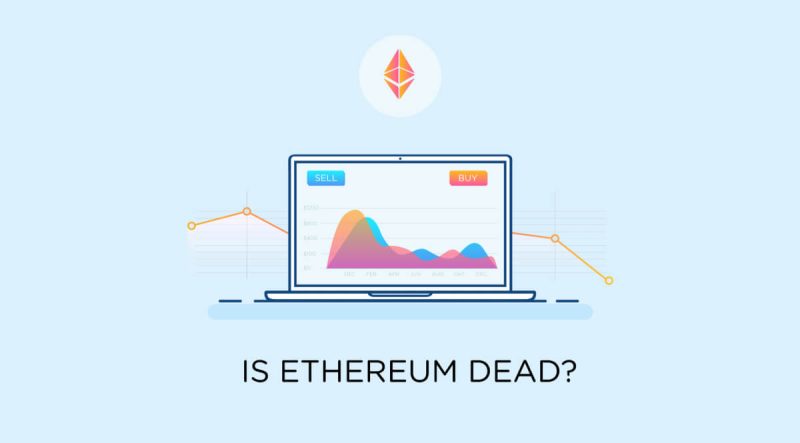Is Ethereum Dead? Trends and Technology Shifts
In 2024, the vitality of Ethereum has sparked widespread curiosity in the digital currency sphere. Many ask, “Is Ethereum Dead?” and is the Ethereum blockchain dead. These questions might surprise many because Ethereum has been a key player in the blockchain realm since its start. It has pioneered smart contracts and decentralized applications (DApps).
Is it possible for such a significant blockchain player to be in decline? Let’s examine the status of Ethereum, the second-largest cryptocurrency by market capitalization.
Ethereum’s performance in 2024
Before we answer the question Is Ethereum Dead or not, let’s tackle its performance.
Market Capitalization: Ethereum ranks as the second-largest cryptocurrency by market cap, emphasizing its importance to users and investors.
Active Developers: Ethereum has the largest community of active developers in the cryptocurrency space, showcasing its dynamic ecosystem.
Decentralized Finance (DeFi): Ethereum leads in DeFi projects, capturing 58% of DeFi liquidity in its ecosystem.
Network Upgrades: Ethereum has recently shifted from Proof of Work to Proof of Stake, significantly boosting its scalability.
NFT Sales: Ethereum dominates the NFT market, conducting most transactions and significant sales, accounting for over 70% of the ecosystem’s trading volume.
The future outlook for Ethereum is both promising and uncertain. Ethereum 2.0 plans to tackle scalability and energy issues, potentially enhancing its capabilities and drawing more users and developers.
Ethereum Shift from POW TO POS
In 2022, Ethereum made a significant shift by transitioning from Proof-of-Work (PoW) to Proof-of-Stake (PoS), introducing what is now known as Ethereum 2.0. This change involved merging with the Beacon Chain, a PoS-based blockchain.
This shift brought about important improvements in Ethereum’s functionality, security, and environmental sustainability. PoS resolves some of PoW’s key challenges, such as:: Reduced Energy Consumption, Lower Hardware Requirements , Increased Scalability
Will ‘Ethereum killers’ beat Ethereum?
For years, many experts have claimed that other blockchains, often called ‘Ethereum killers,’ would surpass Ethereum by offering lower fees and faster transaction speeds.
Despite this, Ethereum remains the top blockchain for smart contracts, outperforming cheaper and more scalable alternatives that have existed for years.
Ethereum’s enduring lead likely stems from its first-mover advantage, as it was the first blockchain to support smart contracts, attracting a vast user base and developer community early on.
Some experts anticipate that Ethereum will coexist with these so-called ‘Ethereum killers’ in the future.
For instance, Chris Dixon, a general partner at the venture capital firm Andreessen Horowitz, advocates for a multi-blockchain future where various smart contract blockchains fulfill different roles.
He suggests that some blockchains could specialize in areas like cryptocurrency games, which often demand higher transaction speeds.
Is Ethereum still a good investment?
The collapse of exchanges like FTX and Voyager triggered a crash in the crypto market, but the core promise of cryptocurrencies remains intact.
If the market for decentralized applications built on Ethereum’s smart contracts keeps growing, ETH’s value is likely to increase.
Predicting Ethereum’s success over the next decade is challenging, yet the blockchain has weathered several market crashes. Today, Ethereum supports thousands of applications, including DeFi protocols, NFTs, cryptocurrency games, and Decentralized Autonomous Organizations (DAOs).
Is Ethereum Dead – Bottom Line
In 2024, Ethereum is drawing significant attention due to its shift from Proof-of-Work (PoW) to Proof-of-Stake (PoS). This transition is expected to spur fundamental growth and attract more investment than Bitcoin.
Market analysts also anticipate the launch of an Ether ETF following a Bitcoin ETF, which would provide a better platform for building dApps on Ethereum and including them within ETFs.
Alongside the Bitcoin halving event and strong optimism for ETFs, experts predict a money flow cycle that will boost market capitalizations, especially for Ethereum.
Bitwise’s 2024 predictions suggest that Ethereum could become one of the fastest-growing tech platforms globally, with experts expecting a doubling of fees from $2.3 billion in 2023. This rapid growth is fueled by the mainstream adoption of crypto applications.
Is Ethereum Dead FAQ
How does Ethereum address scalability concerns?
Ethereum 2.0, an upcoming upgrade, targets scalability issues by introducing sharding and switching to a Proof-of-Stake consensus mechanism.
What are the competitors of Ethereum?
Platforms like Cardano, Polkadot, and Binance Smart Chain compete with Ethereum, offering alternative solutions and growing in popularity among developers.
How does the regulatory environment affect Ethereum
Regulatory changes can influence Ethereum’s adoption and growth. Investors need to keep up with the regulatory landscape and evaluate the risks linked to compliance.
Is Crypto Dead?
Amid the criticism, regulatory hurdles and technological challenges, one thing stands out: the resilience of crypto. Blockchain, the fundamental technology behind most cryptocurrencies, has real, tangible applications across various industries. This real-world usability ensures that even when crypto faces downturns, its underlying value remains intact.
Is Ethereum mining dead?
Ether is the Ethereum blockchain’s native token. It used to be mineable, but mining was removed in 2022.
Does transition to proof-of-stake affect ETH market value?
The shift to proof-of-stake could positively affect Ethereum’s market value. However, overall market trends and other factors might also impact ETH’s price.
The post Is Ethereum Dead? Trends and Technology Shifts appeared first on FinanceBrokerage.

